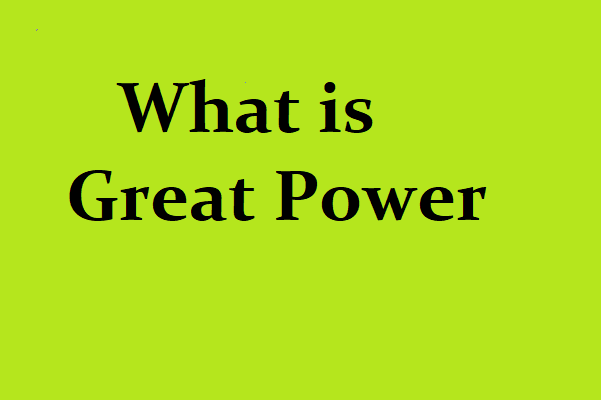What is Great Power?
A global power is the powerful state that is recognized as having the ability and expertise to exert its influence on the global scale. Great powers possess high economic and military strength, that can influences the soft power. It may also cause to middle and small powers to consider the opinions of great power before taking action to their own. Great power status can be characterized into power capabilities, spatial aspects, and status dimensions. United States, Russia, U.K., China and some others states are great power. Historical evidence suggests that these powers have not been soft at all in their course to power struggle. Softness is just opposite of assertiveness and activeness in the power struggle.
The significant economic growth achieved in the past two decades has created a new vision for India in the global stage. Many political observers believe that China and India are going to replace the West’s domination in the global political arena in the next 50 years. At the same time, India’s critics hold a view that unlike China, India does not possess the character to assert itself as a global power. They believe that India is a soft state.
It is true that India has not shown the appreciable characters of a global power in the global stage. It is not because of India’s incapacity but because of its very own nature. Global powers like the US, Britain and Russia have compromised on many values in order to dominate the global polity. But India maintains that all order.
Great Power Control Over Other Nation
The world history is full of examples for domination. Ever since the beginning of modern politics, one nation or other has dominated the global scene. The Britain was the forerunner in this regard. Since the 1600’s till the World War-I, it was the undisputed leader of the world. They used its political system, industrial prowess, naval supremacy to establish colonies all around the world. Post World War II, the US and the USSR emerged as superpowers.
They used their economic power to influence nations in the form of aid and formed spheres of influence. This continued till the 1990’s when the USSR collapsed. Post 1990, the US has projected itself as a world leader. Since then, the US has intervened in the internal affairs of many nations. It sets up puppet regimes, staging coups, providing support to rebel groups and if required it has intervened militarily also.
If we analyse the cases of the UK, the US and the USSR and their periods of domination. We will come into the conclusion that, there are certain commonalities that these states exhibit. Nations in their hope to become the leading global power have resorted unfair activities. They did like exploitation of resources of other countries for economic and military superiority, unfair overthrows of democratic governments. They were also establishing ideological and physical control over other nations for their self-interests, funding international organisations to influence them etc. To put in simple words, in order to become a global power, a nation has to use such unfair practices.
India is Different from Other Nation
India has natural boundaries. It has been surrounded three sides by large water bodies and the Himalayan range acts as indomitable boundary from the north to the north east. The only way of invading the sub-continent is through the north west. It is through this route that the various invaders of ancient and medieval times took place. The British, the French and the Portuguese came through the sea route. India has always been a land which was invaded, It never tried to invade on other nation.
Its never been a policy to claim a territory of the other nation. India always makes far distance from aggression and claiming a territory which is beyond these natural boundaries policy. On the contrary, the people of the sub-continent have integrated the various foreign elements into their own. The Mughals who came as invaders settled down in this land and the people assimilated their culture. In fact, all such assimilation has resulted in the formation of a multi-ethnic, multi-religious society with a composite culture. So, displaying aggression or invading a foreign territory does not align with India’s historical legacy.
To become Great Power
Becoming a global power means many things. There are lot of tussles and disagreements between nations over various issues and big powers are usually take sides in such issues. Often fairness and legitimacy are side-lined and country’s interests form the priority in deciding such stands. The US intervention in Afghanistan in the pretext of eradicating terrorism, its operations in Iraq in the disguise of overthrowing an authoritarian regime are few examples.
India has always maintained that that it would not interfere in the internal affairs of other nations and the political system of a country is to be according to the will of its people. In fact, such non-interference policy of India is deep rooted. Its foreign policy is a result of its nationalistic struggle against Britain. Having lingered under the colonial might of Britain for centuries, the modern makers of India set principles like non-aggression, non-interference, non-alignment with power blocks and peaceful co-existence as the pillars of India’s foreign policy.
However, this does not prevent India from making legitimate claims and taking appropriate stands. India’s claim that J&K is an integral part of the nation, India’s support for Palestinian people, India’s support to Iran for using its nuclear facilities for civilian purposes etc are examples.
So, while rightfully taking appropriate stands and expressing support for democratic, humanitarian causes, India foreign policy correctly guides it to stay away from dominating any region, let alone the whole world.
Conclusion
Softness, at the outset, sounds similar to weakness. India is not a weak nation. It has not hesitated to use its military when its territorial integrity was in danger. It has also not tolerated injustice in its proximity. The Kargil victory over Pakistani infiltration and support to Bangladesh in its freedom struggle are examples.
But in a world where developed nations which have attained considerable political, economic and citizenry maturity, dubbed a developing country’s careful, pragmatic and peace-loving introspection as “softness”. But as seen, India’s geography, long and rich history, the national movement, the culture of its people and its social economic set up give it an identity -‘A soft but not weak nation of peace-loving people.’ India has carved out a niche for itself among the world’s countries as a fair, peace loving, democracy making rapid strides towards human development. India does not aspire to become a powerful nation but a happy nation.

